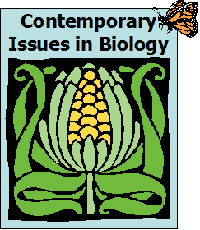
Week 5, Chapter 5 -- Freelance Writer Sample Answer
Course home | Weekly schedule | Announcements | Instructor Info | Desire2Learn | MasteringBiology® | Honor Code | FAQs | HELP!
 |
Week 5, Chapter 5 -- Freelance Writer Sample AnswerCourse home | Weekly schedule | Announcements | Instructor Info | Desire2Learn | MasteringBiology® | Honor Code | FAQs | HELP! |
I have chosen an episode of the comedy The Office for my theme.
Michael: Listen up people! Unless you can help me think of a way to cut costs, corporate is going to downsize our branch of Dunder Mifflin paper products.
Dwight: Why don't we start leaving the lights on in the office at night?
Michael: How would that help?
Dwight: The energy used to power the office is probably generated by a coal-burning power plant and everyone knows that power plants release carbon dioxide as a byproduct of energy production. If we leave the lights on at night we will increase the concentration of carbon dioxide in the atmosphere.
Michael: I still don't get it.
Pam: Dwight, carbon dioxide is a gas that traps heat radiated from the earth. As the amount of carbon dioxide in the atmosphere increases so does the earth's temperature. The process is commonly referred to as global warming. Global warming is a bad thing. I read about a whole island in the south pacific called Tuvalu that is being evacuated because global warming has caused sea levels to rise.
Dwight: Am I the only sane person in this office? Trees need carbon dioxide in order to make sugars, a process known as photosynthesis. Plants contain openings or pores called stomata. These stomata are surrounded by guard cells. In some plants guard cells open during the day, allowing carbon dioxide to diffuse into the plant through the stomata.
Michael: Is he speaking English?
Dwight: Michael! Dunder Mifflin harvests trees to make its paper products. If we make more carbon dioxide available to these trees, they will produce more sugars and be able to grow faster, thus cutting costs and allowing our branch to avoid downsizing.
Pam: But Dwight, increasing carbon dioxide will also lead to an increase in temperature. When plants open their guard cells water is lost to the atmosphere, a process known as transpiration. Transpiration will increase if temperature increases. In order to reduce the loss of water via transpiration plants close their guard cells on hot days. When plants close their guard cells photosynthesis slows. I don't think your plan is going to work.
Michael: Oh Pam, stop trying to depress us. Besides, what do you know? You're just the receptionist.
Jim: Pam's right. This is a stupid idea. If the temperature goes up, the rate at which plant-eating insects undergo cellular respiration will also increase. Cellular respiration is the process in which food energy or sugar is converted into adenosine triphosphate or ATP, a form of energy that can be used by cells. ATP is required by organisms for performing almost all functions including growth and reproduction. If the rate at which insects produce ATP increases, the rate at which they grow and reproduce will also increase. Thus the rate at which they eat trees - trees that we need to make our paper products - will also increase. Leaving the lights on at night is going to end up costing the company!
Michael: Good point. Dwight, you're fired.
Dwight: You can't fire me. I'm Assistant Regional Manager.
Michael: Assistant to the regional manager.
Dwight: Same thing.
525 words
References:
Belk, C. and V. Borden. 2007. Biology: Science for Life, Second Edition. Pearson Prentice Hall. Upper Saddle River, NJ.
[Back to Freelance Writer Assignment]
[Sample assignment by Matt Chumchal]